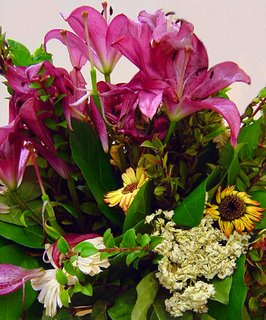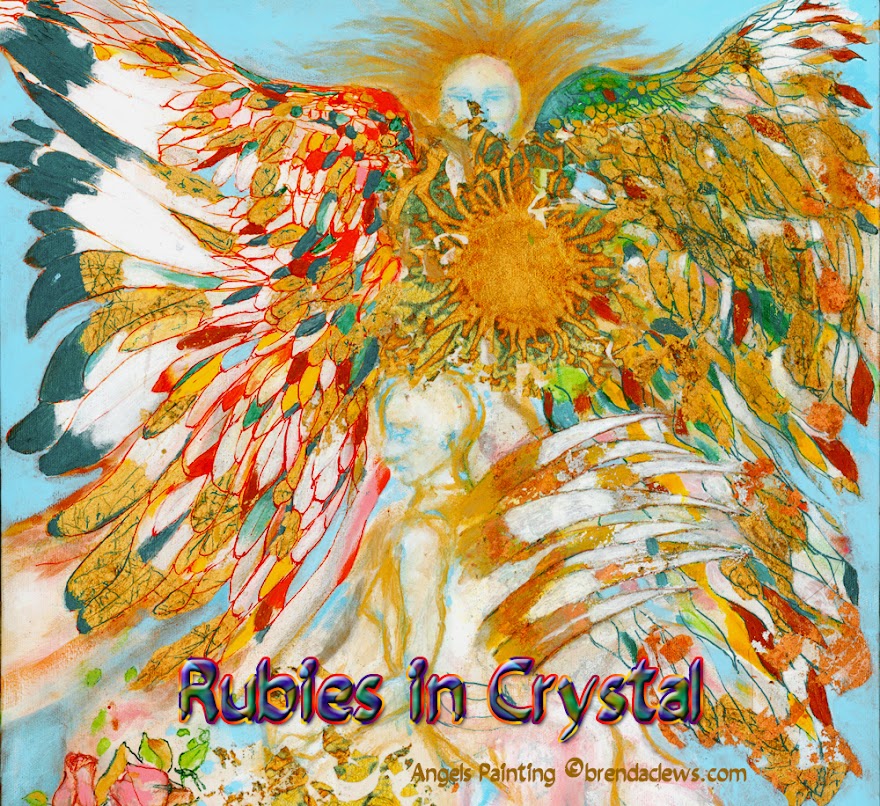click on image for a larger, readable size
Sunday, March 26, 2006
Friday, March 24, 2006
Carework and Caregiving: Theory and Practice
This one's at 9am on May 6th, a Saturday morning:
Caregiving and Evolutionary Ethics: The guardians who undergird culture.
"For a moment, during their conversation, feeling the desperations they spoke of, the difficulties, she felt connected to millions of women over the globe who struggle with poverty, grief, racism, violence, but who keep going. Women who are the emotional centres for their families, who are anchors, who place food on the table miraculously out of almost nothing, who somehow dress their children, their spouses, themselves, who clean and maintain their homes, who work for menial wages, where they are essentially labourers, who never allow themselves to succumb to madness, or drugs, or a furious destruction of the world around them, who keep loving their families in profound ways. They grieve, yes, there is sadness, but they have hearts of compassion. It was here that she felt a bond with the strength of women throughout the ages. She knew she was alive, living in her generation, carrying the flame of continuous love through the marathon that history is, only because her foremothers had also carried it and passed it on. If mothering is a stable, conservative force, if that's what happens to women as they take on the responsibility and role of motherhood, then she was grateful for it. This was where there was meaning, the staying-with-it through everything, the power to endure, to continue." Brenda Clews, The Move.
Caregiving is a core ethical value. Unfortunately care of others, especially the most vulnerable and important for the future of 'the race,' children, often falls to women who are mothers, and who, one might say, because of this role, become the keepers of the continuous flame of evolution. Such processes as "natural selection" could not, I would argue, produce a highly complex species without the continuous care provided by women who take on the caregiving role, and so become, not just metaphorically but in a very real sense, 'guardians' who undergird the enterprise of culture. In this talk I will align caregiving with a discussion of evolutionary ethics and read a short selection from my unfinished novel, The Move.
Bio: Brenda Clews is a writer, artist, dancer and single mother living in Toronto. She has degrees in Fine Arts and English Literature from York, and an unfinished Interdisciplinary Studies thesis on the maternal body. She is currently writing an autobiographical novel about living in uncertainty, and about existing outside the dominant discourses, entitled, The Move.
This one's at 2:30 that afternoon:
The creative writing piece:
Towels hung on the door, an accidental spectrum
In these photopoems, I explore my daughter's relationship to her body. As a feminist and as a woman who struggled with bulimia many years ago as I came to terms with my own female body, it is hard to witness my daughter undergoing the same struggles. At 15 she is radiant as the sun who cannot see its own beauty. These prose poems explore the difficulties girls face with media and peer pressure to sculpt themselves into more perfect images of what is considered beautiful by the general culture.
I wrote to her... "Please use the same bio I sent with the other abstract. Am I aiming for 10-15 minutes of reading here?"
_________________
I've barely written anything. The first talk is 15-20 min, that's easy. The second panel seems to consist of only two of us, which means an hour and 15 minutes each! I had thought of writing 4 pieces, taking up 12 -15 minutes, so this is going to require some planning. I'll probably take a disc of my photopoesis pieces, or dig up some old work... though, oh dear, I can't. Lost in storage...
There are so many writers and poets and artists out there, how come this panel is so under-represented? The last time I joined a creative writing panel at one of these conferences, it was packed, with writers and audience, and we each got 10 minutes to read... some of those pieces were incredibly moving and became the highlight of the entire weekend.
Thursday, March 23, 2006
Engagement
Today I'm considering engagement. It's important. Sometimes you do things without really doing them. Meditation this last week has been difficult because I've done the meditation without really doing it. If you know what I mean. It's about engagement. In meditation and in my work.
 By focusing some good intent on my book, and even having it beside me while I sleep, seems to have re-charged my relationship to it. I finally have an ending, and not the one I expected, but it is congruent with the text. As I re-read, editing, how painful the narrative is. Yet with so many unfinished manuscripts and thesis's (two and two), bringing something to completion is of particular importance. That's a meditation in itself: the hexagram of completion.
By focusing some good intent on my book, and even having it beside me while I sleep, seems to have re-charged my relationship to it. I finally have an ending, and not the one I expected, but it is congruent with the text. As I re-read, editing, how painful the narrative is. Yet with so many unfinished manuscripts and thesis's (two and two), bringing something to completion is of particular importance. That's a meditation in itself: the hexagram of completion.Engagement isn't completion, they're two different processes with two different purposes. Engagement is being in the present, fully participating in whatever it is you're doing. Full focus; undivided attention; the complete synaesthesia possible for any particular connection. But engagement is needed for completion, especially when the mind wanders, creating posts on why we write in blogs and spending copious hours photoshopping a photo, recording a reading that didn't work until giving up and going for the sweetness of the yoga teacher's voice, ooh la, should I tell you that? Today the manuscript lies open before me, and have I spent as much a one second looking at it? I've had a breakfast of 12 grain bread and melted cheese, mugs of coffee, erased the grey in my hair with colour, showered, had curry for lunch already and it's not even noon!
I've hugged the dog lots, eaten grapes, wiped counters, done dishes, laundry, sent emails, considered all my relationships, focused on what I need at the present to continue, collected my life, you know the song.
Oh, did I tell you about the fresh strawberries, almost over-ripe, that you slice into a bowl and put a good-sized dollop of cream cheese on and sprinkle generously with raw sugar? In the microwave for 40 seconds, mix it all up, and it's almost like having cheesecake! Instantly, that is.
Do I have 2 hours a day for my book? Of course I do. Now that I know the ending, I can focus the writing.

Editing.
Engagement.
Wednesday, March 22, 2006
Why Do You Write?
 How can I take the reader's perspective into account when I write? I write from excess, from overflow, from abundance, a plethora, a cyclone of words. Aren't we all on journeys, discovering our way as we go? Mine isn't a journey of logic, nor do I know the path or the map that'll finally result from it all. I don't have a specific set of interests to write about. Though I do favour prose poetry and exploring emotional landscapes. My lifewriting is often hidden in metaphors, obscured with fictions, offered as a tie-dyed garment of brightly coloured silk, fragile and soft as the morning sun, or as dense dark broadcloth heavy with grime and flung before you. For I don't know who you are. I can only guess. With your writing at your sites, in comments, I create a sense of you that is surely only a part of who you are. We dance together, oh, yes, we do this, in our writing, our interconnections, and it's fun, most enjoyable, but I wonder about the intersections, parallels, curvatures, and parabolas of our intertextual writing. We share our core values, deeper selves, revealing who we are in ways that we might not in social situations, we let each other overhear us, our soliloquys, yet we are always cognizant of each other, and each other's perspectives. We love the dialogues we have. Small sitting rooms for writers writing on writing, where the style of the saying counts, not just what is said. Let's share fine champagne and fresh strawberries and talk of art and literature and philosophy and each other's joys and travails with the perfection that a purely writerly existence affords. It's a luxury, living through words like this. We can be true to our most generous, loving selves. Posts fall like golden leaves, etched with our words, disappearing into the world, a world that is surely far richer for what we are sharing.
How can I take the reader's perspective into account when I write? I write from excess, from overflow, from abundance, a plethora, a cyclone of words. Aren't we all on journeys, discovering our way as we go? Mine isn't a journey of logic, nor do I know the path or the map that'll finally result from it all. I don't have a specific set of interests to write about. Though I do favour prose poetry and exploring emotional landscapes. My lifewriting is often hidden in metaphors, obscured with fictions, offered as a tie-dyed garment of brightly coloured silk, fragile and soft as the morning sun, or as dense dark broadcloth heavy with grime and flung before you. For I don't know who you are. I can only guess. With your writing at your sites, in comments, I create a sense of you that is surely only a part of who you are. We dance together, oh, yes, we do this, in our writing, our interconnections, and it's fun, most enjoyable, but I wonder about the intersections, parallels, curvatures, and parabolas of our intertextual writing. We share our core values, deeper selves, revealing who we are in ways that we might not in social situations, we let each other overhear us, our soliloquys, yet we are always cognizant of each other, and each other's perspectives. We love the dialogues we have. Small sitting rooms for writers writing on writing, where the style of the saying counts, not just what is said. Let's share fine champagne and fresh strawberries and talk of art and literature and philosophy and each other's joys and travails with the perfection that a purely writerly existence affords. It's a luxury, living through words like this. We can be true to our most generous, loving selves. Posts fall like golden leaves, etched with our words, disappearing into the world, a world that is surely far richer for what we are sharing.I write out of excess. I write because
I'm too full. Over-ripe. Spilling out.
The corset of silence too tight.
I write because I'm pregnant and have
to give birth.
It's the extravagance of living.
The fertility of words.
Because I carry around
a wild dictionary in my head.
Because of the aesthetics of expression,
how satisfying it is to compose, to share.
A thought, a heart motion, a poem, a gift.
From me, but to you.
Why do you write?
Monday, March 20, 2006
Abandoned Bouquet
 Push-pull confuses me. Especially the push-away.
Push-pull confuses me. Especially the push-away. We hurt each other with rejection.
The force with which we can expel each other. Turning the other into an object of non-importance, an unwanted essence. The ability to savour, to honour, to love: the self, others, the world, damaged. But love doesn't happen in isolation. Maybe some have their lists of good and bad. But it's not that easy. It's not that this person, or people, state of mind, area of interest is safe, acceptable and all else needs to be distanced. Isn't that possession? And possessions can be lost. If they're people, they can leave; if they're belief systems or areas, we can become profoundly disenchanted. Then where are we? In angry rebuttal to the world that we clearly divided between acceptable and not. Between people who counted and those who didn't. Between an arbitrary definition of the good and the not-good. So what do we do? Do we cling more tightly to our safe constructed categories of who is and who isn't even when they might betray us, or do we give way and open out to the mystery that has no name, is amorphous, all-pervading, without judgement? A light that shines everywhere without discrimination. If we could spend one year of our lives not rejecting what would happen? Would it open out in magnificent ways, this ability to love?
Or would be we overwhelmed? Is the push-pull, rejection-acceptance, necessary for homeostasis, for balance?
Breathe in; breathe out.
As I tell my yoga students, make sure your in-breath and out-breath are equal - that what you take in and what you give out balance.
But. Push-pull. Wound-heal. Why do I do this? Is there no other way?
Saturday, March 18, 2006
Rose Mandala, or the Whorls of Angels
Rose Mandala, or the Whorls of Angels: Lo
Rose Mandala, or the Whorls of Angels: Hi
 I am with you like an angel. Can you feel kisses, a caress of breeze perhaps, or a sudden warmth that lightens your spirit? I hold you enfolded in my wings when you weep, inconsolable, disappointed. Can you sense a blessing of radiance about you? My wings, woven of sun and moonlight on veins like leaves. Surely you see their shimmer breaking through what separates us. You are my prayer, my vigil.
I am with you like an angel. Can you feel kisses, a caress of breeze perhaps, or a sudden warmth that lightens your spirit? I hold you enfolded in my wings when you weep, inconsolable, disappointed. Can you sense a blessing of radiance about you? My wings, woven of sun and moonlight on veins like leaves. Surely you see their shimmer breaking through what separates us. You are my prayer, my vigil.But I am an earthy woman who laughs, storms, cries, rants, pesters, and loves.
And I am unable to settle, come into being in one place, crystallize. Can I play in the garden palaces of the heart? And retire in solitude when the day is done, to rest?
Even as I sweep across the sky of your consciousness, a roseate sunset, mandala whorl of sun, the choral clouds, like a hymn, a sacred song, something ebullient and therefore holy, I am racing away into the night and disappearing.
I offer you a guardian, a keeper of the flame of your heart, a high priestess who holds your innermost secrets, a temple to honour your prayers on love, but it's ephemeral, Akashic, in the place where everything is recorded, where what we are, our memories, our dreams, are held safe. Nothing you could hold onto, nothing at all.
I am here; but you cannot see me.
Wednesday, March 15, 2006
Fundamentalism
 One set of beliefs though which you define yourself. Is this fundamentalism? That set of beliefs is also a formulae. A code in a sacred text; the ordinances of the ordinated; a belief in the reward of rightness. Happiness to be on the one path to salvation, whatever it may be. In every movement, surge of social beliefs, group with a purpose, religion, are fundamentalists. Those who place whatever doesn't agree with their creed into a category of evil to be opposed with all force, vehemently. Fundamentalism is the opposite of acceptance. Fundamentalism takes the complexity out of living. It replaces a sensitive tuner, an ethic of compassion, a cognizance of difference, shades of infinite grey, with certainty. Instead of the vast and perplexing mystery of living, one set of beliefs through which a person defines themselves and others. One path to walk. One goal to achieve.
One set of beliefs though which you define yourself. Is this fundamentalism? That set of beliefs is also a formulae. A code in a sacred text; the ordinances of the ordinated; a belief in the reward of rightness. Happiness to be on the one path to salvation, whatever it may be. In every movement, surge of social beliefs, group with a purpose, religion, are fundamentalists. Those who place whatever doesn't agree with their creed into a category of evil to be opposed with all force, vehemently. Fundamentalism is the opposite of acceptance. Fundamentalism takes the complexity out of living. It replaces a sensitive tuner, an ethic of compassion, a cognizance of difference, shades of infinite grey, with certainty. Instead of the vast and perplexing mystery of living, one set of beliefs through which a person defines themselves and others. One path to walk. One goal to achieve.  One perspective on those who follow the "illumined path" and those who don't. Fundamentalism is an escape from the responsibility of living. Of living in the impossibility of time, with uncertainty, in the flux of ideas, events, emotions, unpredictable happenings with a mass of people who are equally unknown. Fundamentalism is like the virus that invades to overtake the whole system and make it its own. In its success it kills the very spirit that gave it life.
One perspective on those who follow the "illumined path" and those who don't. Fundamentalism is an escape from the responsibility of living. Of living in the impossibility of time, with uncertainty, in the flux of ideas, events, emotions, unpredictable happenings with a mass of people who are equally unknown. Fundamentalism is like the virus that invades to overtake the whole system and make it its own. In its success it kills the very spirit that gave it life.
Woman with Flowers 7.1
(7th sketch in series, first iteration of this one) Woman with Flowers Flowers, props upholding the woman. The flowers, fragrant, imaginar...

-
The Buddha says: “ You cannot travel the path until you have become the path itself .” The path is uncertain. Uncertainty is the guiding for...
-
What if relationships are the primary ordering principle? What if the way relationships are ordered clarify, explain, and instruct us on th...
-
direct link: Tones of Noir music: Alex Bailey, ' Piano Improvisation No 7 .' Do poems wait to be born? A poem whittled out of t...

